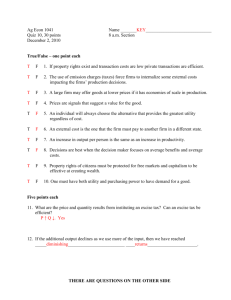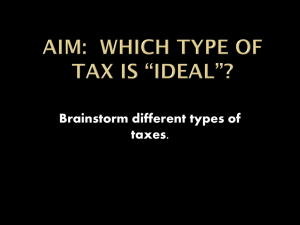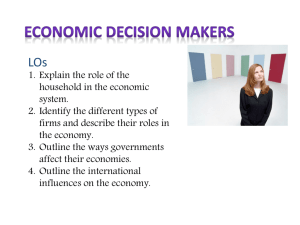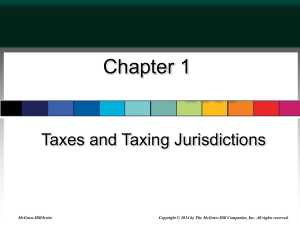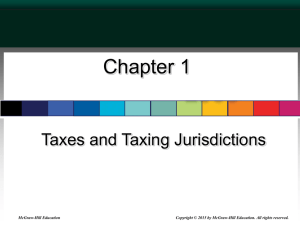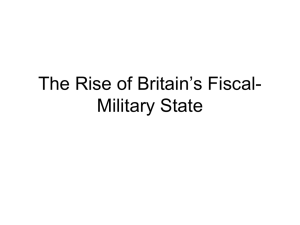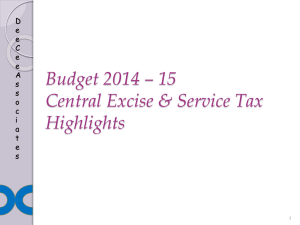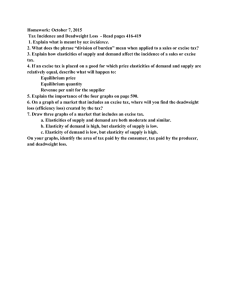Telephone Excise Tax: Why Keep a Bad Tax?, The
advertisement
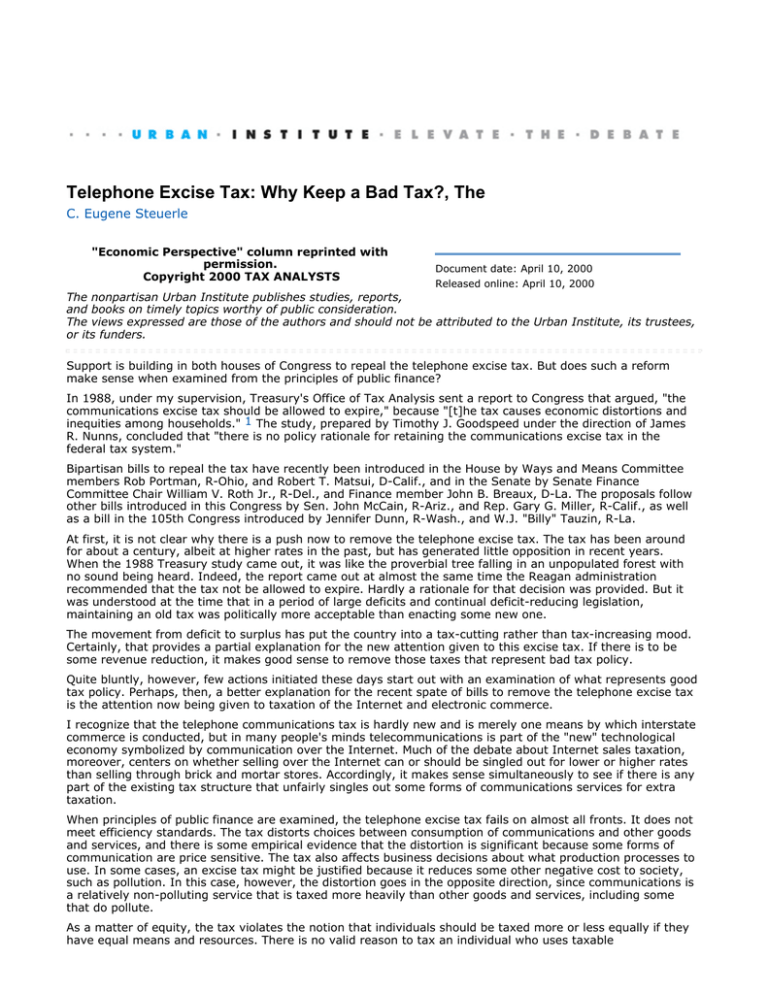
Telephone Excise Tax: Why Keep a Bad Tax?, The C. Eugene Steuerle "Economic Perspective" column reprinted with permission. Copyright 2000 TAX ANALYSTS Document date: April 10, 2000 Released online: April 10, 2000 The nonpartisan Urban Institute publishes studies, reports, and books on timely topics worthy of public consideration. The views expressed are those of the authors and should not be attributed to the Urban Institute, its trustees, or its funders. Support is building in both houses of Congress to repeal the telephone excise tax. But does such a reform make sense when examined from the principles of public finance? In 1988, under my supervision, Treasury's Office of Tax Analysis sent a report to Congress that argued, "the communications excise tax should be allowed to expire," because "[t]he tax causes economic distortions and inequities among households." 1 The study, prepared by Timothy J. Goodspeed under the direction of James R. Nunns, concluded that "there is no policy rationale for retaining the communications excise tax in the federal tax system." Bipartisan bills to repeal the tax have recently been introduced in the House by Ways and Means Committee members Rob Portman, R-Ohio, and Robert T. Matsui, D-Calif., and in the Senate by Senate Finance Committee Chair William V. Roth Jr., R-Del., and Finance member John B. Breaux, D-La. The proposals follow other bills introduced in this Congress by Sen. John McCain, R-Ariz., and Rep. Gary G. Miller, R-Calif., as well as a bill in the 105th Congress introduced by Jennifer Dunn, R-Wash., and W.J. "Billy" Tauzin, R-La. At first, it is not clear why there is a push now to remove the telephone excise tax. The tax has been around for about a century, albeit at higher rates in the past, but has generated little opposition in recent years. When the 1988 Treasury study came out, it was like the proverbial tree falling in an unpopulated forest with no sound being heard. Indeed, the report came out at almost the same time the Reagan administration recommended that the tax not be allowed to expire. Hardly a rationale for that decision was provided. But it was understood at the time that in a period of large deficits and continual deficit-reducing legislation, maintaining an old tax was politically more acceptable than enacting some new one. The movement from deficit to surplus has put the country into a tax-cutting rather than tax-increasing mood. Certainly, that provides a partial explanation for the new attention given to this excise tax. If there is to be some revenue reduction, it makes good sense to remove those taxes that represent bad tax policy. Quite bluntly, however, few actions initiated these days start out with an examination of what represents good tax policy. Perhaps, then, a better explanation for the recent spate of bills to remove the telephone excise tax is the attention now being given to taxation of the Internet and electronic commerce. I recognize that the telephone communications tax is hardly new and is merely one means by which interstate commerce is conducted, but in many people's minds telecommunications is part of the "new" technological economy symbolized by communication over the Internet. Much of the debate about Internet sales taxation, moreover, centers on whether selling over the Internet can or should be singled out for lower or higher rates than selling through brick and mortar stores. Accordingly, it makes sense simultaneously to see if there is any part of the existing tax structure that unfairly singles out some forms of communications services for extra taxation. When principles of public finance are examined, the telephone excise tax fails on almost all fronts. It does not meet efficiency standards. The tax distorts choices between consumption of communications and other goods and services, and there is some empirical evidence that the distortion is significant because some forms of communication are price sensitive. The tax also affects business decisions about what production processes to use. In some cases, an excise tax might be justified because it reduces some other negative cost to society, such as pollution. In this case, however, the distortion goes in the opposite direction, since communications is a relatively non-polluting service that is taxed more heavily than other goods and services, including some that do pollute. As a matter of equity, the tax violates the notion that individuals should be taxed more or less equally if they have equal means and resources. There is no valid reason to tax an individual who uses taxable communications services more than someone who eats a lot or drives expensive cars. Finally, from the standpoint of simplicity, of course, repeal would remove one source of taxation, eliminate a moderate amount of paperwork, and simplify the tax structure. The 1988 Treasury study was actually the response to a congressional mandate to study communications services exempt from the telephone tax -- with some notion that perhaps those exemptions should be lifted. I thought at the time that we could not respond to that request adequately without examining the fundamental fairness and efficiency of the basic tax. The problem was the following: By taxing only some forms of communications, the existing tax created a number of distortions and inequities among alternative types of communication. But every time we examined how to move the line further toward taxing some additional form of communication, we found yet other forms of communications services that were still exempt. The problem becomes even more intense as new and different forms of communication are developed. Telephone wires get replaced by satellites and wireless communication. Telephone calls get replaced by e-mail. Within a business, internal communication via a server owned by the business replaces the traditional phone system channeled through a network set up by the local telephone company. If private business ownership of a communications vehicle is not taxed, what about leased services? And if leased services are not to be taxed, then what about buying telephone services through an outside telephone company that owns the equipment? And for that matter, just what is communications equipment? Is a computer a piece of communications equipment? How about cables used for TV and then used for Internet communications? What about TV itself? And so on. You can quickly see the sort of problem that develops with this type of tax. In the end, fairly arbitrary definitions are required, and the practical result is to tax mainly the services of companies that are big, and identifiable. Thus, we can see why taxation of utilities and utilities' services have been so popular with politicians over time. With the breakdown of a utility model for taxing communications, the existing tax becomes arcane and extraordinarily arbitrary even if it didn't already violate the principles of public finance in other ways. FOOTNOTE 1. The Treasury study, "Report to the Congress on Communication Services Not Subject to the Federal Excise Tax," can be found at 87 TNT 184-5. Other Publications by the Authors C. Eugene Steuerle Usage and reprints: Most publications may be downloaded free of charge from the web site and may be used and copies made for research, academic, policy or other non-commercial purposes. Proper attribution is required. Posting UI research papers on other websites is permitted subject to prior approval from the Urban Institute—contact publicaffairs@urban.org. If you are unable to access or print the PDF document please contact us or call the Publications Office at (202) 261-5687. Disclaimer: The nonpartisan Urban Institute publishes studies, reports, and books on timely topics worthy of public consideration. The views expressed are those of the authors and should not be attributed to the Urban Institute, its trustees, or its funders. Copyright of the written materials contained within the Urban Institute website is owned or controlled by the Urban Institute. Source: The Urban Institute, © 2012 | http://www.urban.org
